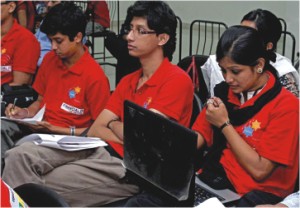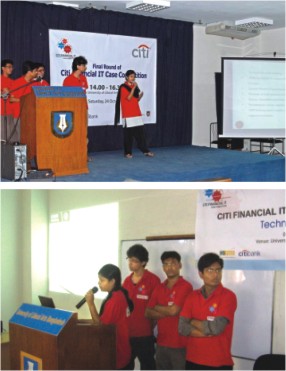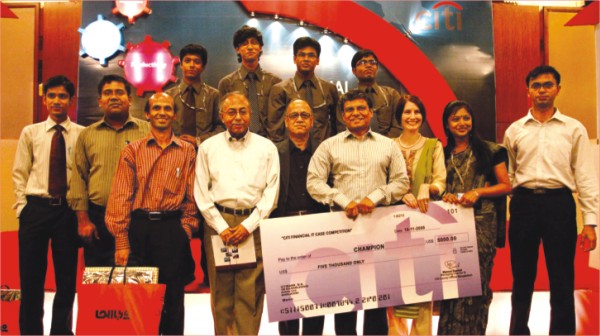|  Spotlight Spotlight
Clash of Future Finance Managers at ULAB
The challenge: Citi Foundation and D.Net called upon universities to create technological solutions for the financial sector, which would benefit the country. The setting: the Citi Financial IT Case Competition (CFICC). The requirements: a combined team of business and technology students working together. The reward: US $5,000 and a chance to make a direct difference in the lives of the people of Bangladesh.
Around 54 teams from 20 universities, both public and private, responded to the call. With University of Liberal Arts Bangladesh (ULAB) being the CFICC university partner, our reputations were on the line. Our two software development teams, ULAB-Geeks and ULAB-Diligent, took up the challenge.
Citi Foundation, the philanthropic arm of Citibank NA Bangladesh, and D.Net (Development Research Network) organized this first-ever Case Competition. The competition was formally launched by State Minister for Science and ICT, Architect Yeafes Osman at the ULAB Auditorium.
One thing we agreed from the start was that it had to be mobile phone-based. In our country, internet usage is limited even in the urban environment. But with about 5 crore people using mobile phones in both urban and rural areas, it was obvious that any banking solution based on mobile technology would be accessible to most people.
Our Business Administration teammates had visited several banks as part of their BBA studies. Some of the difficulties in the banking experience became apparent to them at that time, namely the lengthy and insecure procedure of financial processing itself. The time spent traveling to the bank during its office hours, long waiting within the bank, the lack of 24 x7 access to one's account, as well as the insecurity of handling cash, were all factors that made us think we could create a system that would benefit both customers and the banks.
 We decided to pursue an E-SMS (Extended SMS) Banking service to overcome these complexities. After a lot of research, we felt that only Client Software installed on Java-supported mobile phones or PDAs (Personal Digital Assistant) using Short Message Services (SMS) would allow bank customers to access banking services and transactions. We decided to pursue an E-SMS (Extended SMS) Banking service to overcome these complexities. After a lot of research, we felt that only Client Software installed on Java-supported mobile phones or PDAs (Personal Digital Assistant) using Short Message Services (SMS) would allow bank customers to access banking services and transactions.
In fact, there are already SMS-based banking facilities available in Bangladesh. However, there are several issues with the current systems. The first and most important is security. Existing services are open and insecure, allowing the possibility of theft of one's important account information.
The second problem is that the current systems are text-based, making them little complicated for the user. This is the reason we decided to base our solution on Java 2 Micro Edition (J2METM), which is the most widely-used application platform for mobiles. Java enabled us to create a user-friendly graphical user interface (GUI) that would make the experience convenient and intuitive.
However by far the biggest challenge was how to make the data and communication secure. After the first round, this was the issue that the jurists most strongly pushed us on. Security and privacy had to be start-to-finish. For example, if a client's phone is stolen, no one should get their account numbers. The data sent would be internally directed to the bank and encrypted so it could not be received and interpreted by a third party. Only authorized users at the bank would have visibility into the transaction.
In our solution, all access is based on UserID and Password, and the account number is stored using the internal database of the mobile for user convenience. Because the outgoing request is not saved in the SENT box, the security is ensured.
For data transfer, we searched for an open-source encryption algorithm. The answer we chose was MD5 (Message Digest Algorithm 5), because it is free, open source, and widely accepted as an international standard.
The CFICC itself was a grueling 4-month long process, with teams presenting their solutions in each round before eminent jury panels who assessed them based on the project evaluation guidelines.
After the 2nd Round each team was assigned a jury member who honed the teams' skills. It was this attention to detail that showed us that Citi Foundation and D.Net wanted marketable quality in all the finished products.
The final round and the Gala event announcing the winners was held a few weeks later in the Sonargaon Hotel Ballroom. The 2nd runner up was Bangladesh University of Engineering and Technology (BUET-SANGFROIDS); the 1st runner up was Shahjalal University of Science and Technology (SUST-Web Pioneer). Besides ULAB, the two other finalists were Dhaka University (DU-MIS) and United International University (UIU-CATALYST).
Finally, the champions were announced. ULAB-Geeks and our E-SMS solution had won the championship. AKM Abdul Awal Mazumder, Secretary for Science and ICT Ministry, awarded the prize money and crest to all the winners. Mamun Rashid, Managing Director and Citi Country Officer for Bangladesh, Prof Rafiqul Islam, Vice Chancellor of ULAB, and Ananya Raihan, Executive Director of D.Net, were also present at the Gala program.
It must be emphasized that all the teams had amazing and important solutions. Each team put forth their best, and their solutions will all benefit Bangladesh by simplifying financial access for the people.
ULAB-Geeks are currently developing a Bangla-language interface. Once based in Bangla, this solution will bring bank access to the rural sectors of Bangladesh. Also remittance transfer, and stock market alerts will be seen in this system in near future. E-SMS is part of a new era in banking. It will stimulate bank usage and contribute to the greater goal of a Digital Bangladesh by bringing banking into the palm of one's hand.

The competition was the first of its kind in Bangladesh to create opportunities for young and talented minds from different public and private universities, and to let their talents shine through unique software and information system development for the financial sector. The main goal of the competition was to promote a culture of business and technology development amongst the future leaders of the country based on the local needs as well as global business demands.
The ULAB-GEEKS were led by Amitav Paul, Lecturer, Computer Science & Engineering (CSE), and comprised of the following students: Abdullah-Al-Mamun (Electronics and Telecommunications Engineering), Racy Gomes (Electronics and Telecommunications Engineering), Tanjila Tajrin (Business Administration), Abdullah-Al-Muzahid (Business Administration). We were guided by our respected teachers, Dr. Syed Akhter Hossain, Amitav Paul and Tanvir Atahary in the Computer Science & Engineering and Electronics & Telecommunication Engineering Departments, and also Hasan Shirazi in the Business School.
The fifty-four teams who participated were from 20 universities: Bangladesh University of Engineering and Technology (BUET), the University of Dhaka, BRAC University, Daffodil Institute of IT, Daffodil International University, East West University, Eastern University, Hajee Mohammad Danesh Science and Technology University, Institute of Business Administration (IBA) of DU, Institute of Science and Technology, International Islamic University, Chittagong, Jahangirnagar University, Khulna University, Khulna University of Engineering and Technology, North South University, Shahjalal University of Science and Technology, South East University, The University of Asia Pacific, United International University, and the University of Liberal Arts Bangladesh.
Compiled and reported by ULAB-Geeks Racy Gomes, Abdullah-Al-Mamun, Abdullah Al Muzahid (Tarif) and Tanjila Tajrin, with assistance of ULAB faculty members Amitav Paul and Juditha Ohlmacher.
|

